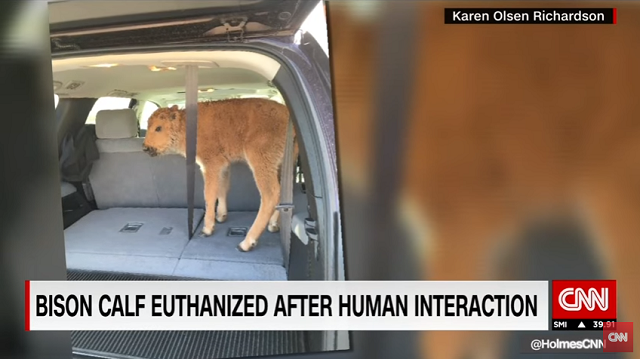
“Today, more than ever before, life must be characterized by a sense of Universal responsibility, not only nation to nation and human to human, but also human to other forms of life.” ~ The Dalai Lama
As humans, we often strive to bond with other creatures. While in many cases our desire to help non-human animals is effective (for instance adopting a rescue dog), in other cases, it’s destructive.
Recently, the actions of well-meaning visitors at Yellowstone National Park backfired dramatically, leaving a bison calf dead.
Last week, two tourists encountered the calf and thought it was in trouble, so they herded it into their SUV. The tourists quite literally took nature into their own hands, with tragic consequences. When the tourists, who were reported to be from another country, brought the calf to the ranger’s station, they were cited for their dangerous deed.
A statement on the Yellowstone National Park’s Facebook page read, “This was a dangerous activity because adult animals are very protective of their young and will act aggressively to defend them. In addition, interference by people can cause mothers to reject their offspring.”
Unfortunately, this is exactly what happened.
After the tourists who nabbed the bison calf returned it to park officials, rangers attempted to reconnect the calf with its mother several times. Each attempt failed, with the mother abandoning the calf repeatedly. The confused calf continued to approach vehicles and visitors. Ultimately, the park staff euthanized the calf.
It’s difficult to imagine a scenario in which it seems like a good idea to stuff a large, wild mammal in one’s automobile. However, the fact that the tourists were likely doing what they thought was best for the creature is what makes it such a striking story.
Maybe it’s time to revisit some laws of the land to keep us—and the wild animals we encounter—safe. Here are four tips to keep wild animals, and yourself, from tragic incidents like this one:
Don’t approach wild animals. The Yellowstone National Park, in response to the bison calf incident, posted, “Approaching wild animals can drastically affect their well-being and, in this case, their survival.” In other cases, humans can be injured. Yellowstone National Park reported that five park visitors were seriously injured in 2015 after approaching bison too closely.
Don’t feed wild animals. Just as you don’t eat the dead field mice your cat gives you, please don’t feed wild animals. Human food isn’t created with a wild animal’s biology in mind. Feeding animals can often inhibit their innate fear of humans, causing them to leave their habitat and roam too closely to our homes, ultimately putting them in danger.
Don’t handle wild animals. Much like the bison calf, mothers will often reject their babies if they smell a human scent on them. If you find an injured animal, contact a wildlife rehabilitation center.
Be extra cautious when encountering baby animals. Baby animals are almost always adorable. But near those cute baby animals, protective and unpredictable mothers often lurk. And, like in the case of the bison calf, handling babies could leave a human scent leading their parents to reject them.
As humans, it’s our duty to protect and respect our fellow earth-dwellers. Err on the side of caution, and let the experts do their jobs.
Author: Lynn Shattuck
Editor: Nicole Cameron
Image: YouTube screenshot


Read 1 comment and reply